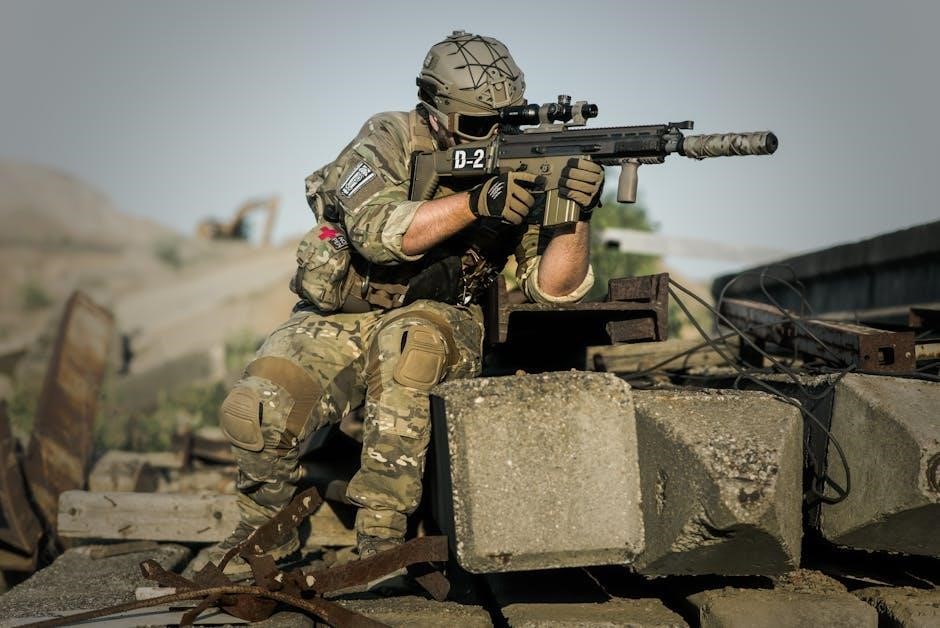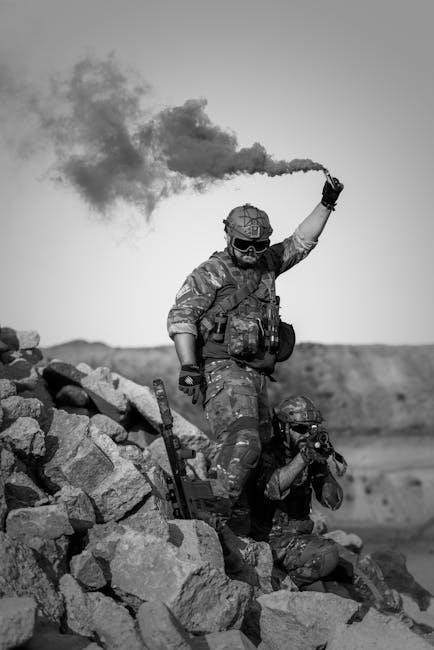Operation Daguet was France’s military contribution to the Gulf War, launched in response to Iraq’s invasion of Kuwait in 1990. It involved both defensive and offensive phases, ultimately aiding in Kuwait’s liberation.

1.1 Historical Context of the Gulf War
The Gulf War (1990-1991) was precipitated by Iraq’s invasion of Kuwait on August 2, 1990, under Saddam Hussein’s regime; Iraq, emerging from an eight-year war with Iran, faced significant debt and sought to expand its oil resources. Kuwait, a key oil producer, became a target. The international community condemned the invasion, leading to UN Resolution 678, which demanded Iraq’s withdrawal by January 15, 1991. When Iraq refused, a coalition of 35 nations, led by the United States, launched Operation Desert Storm. France, as a key coalition member, deployed its military under Operation Daguet. This conflict marked a pivotal moment in post-Cold War geopolitics, highlighting the importance of collective security and the strategic significance of the Gulf region.
1.2 France’s Role in the Coalition
France played a significant role in the Gulf War coalition, contributing land, air, and naval forces under Operation Daguet. President François Mitterrand announced French involvement on August 9, 1990, deploying assets like the aircraft carrier Clemenceau and naval vessels to secure the Gulf. The French military focused on defensive operations in Saudi Arabia initially, ensuring regional security. As tensions escalated, France participated in airstrikes and ground operations, with the French Army’s Division Daguet integrating into the coalition’s offensive strategies. France’s involvement underscored its commitment to international security and its historical ties to the region. The operation also highlighted France’s military capabilities and its role as a key global player in collective defense efforts, aligning with UN resolutions and coalition objectives to liberate Kuwait and stabilize the region.

Key Phases of Operation Daguet
Operation Daguet included defensive deployment in Saudi Arabia, air and naval contributions, and ground operations, culminating in the liberation of Kuwait alongside coalition forces.

2.1 Defensive Deployment in Saudi Arabia
The initial phase of Operation Daguet involved the deployment of French forces to Saudi Arabia to bolster defenses against potential Iraqi advances. This included the arrival of the aircraft carrier Clemenceau and other naval vessels, which played a crucial role in securing the Gulf. General Roquejoffre commanded the French contingent, with headquarters established in Riyadh. The defensive posture aimed to protect Saudi territory and ensure regional stability. Troops and equipment were strategically positioned to deter further Iraqi aggression while preparing for potential offensive operations. This phase laid the groundwork for France’s contributions to the broader coalition effort, demonstrating its commitment to the liberation of Kuwait and the restoration of regional security.
2.2 Air and Naval Contributions
French air and naval forces played a pivotal role in Operation Daguet, contributing significantly to the coalition’s success. The French Air Force conducted numerous sorties, targeting Iraqi positions and infrastructure, while the Navy enforced maritime blockades and protected supply routes. The aircraft carrier Clemenceau was central to these operations, providing air support and ensuring control of the Gulf’s waters. Naval units also participated in Operation Artimon, monitoring key straits like the Strait of Hormuz and the Bab-el-Mandeb, ensuring the flow of resources and preventing Iraqi attempts to disrupt global trade. These efforts underscored France’s strategic capabilities and its ability to project power in a multinational context, reinforcing its position as a key player in the coalition.
2.3 Ground Operations and Liberation of Kuwait
The French ground forces played a decisive role in the liberation of Kuwait during Operation Daguet. The French division, integrated into the coalition’s strategy, conducted operations alongside allied forces to dismantle Iraqi defenses. Positioned in Saudi Arabia, the division participated in the ground offensive, breaching Iraqi lines and securing strategic positions. The French contingent demonstrated operational effectiveness, particularly in combined arms maneuvers and rapid terrain exploitation. Their actions contributed to the swift liberation of Kuwait, showcasing France’s military capabilities within a multinational framework. The success of these ground operations reinforced France’s strategic influence and highlighted its commitment to international security, marking a significant chapter in its military history. The liberation of Kuwait remains a testament to the effectiveness of coordinated coalition efforts.

Strategic Impact of Operation Daguet
Operation Daguet strengthened France’s geopolitical influence and showcased its military capabilities, reinforcing its role in international coalitions and modern warfare strategies.
3.1 Military Lessons Learned
Operation Daguet provided valuable military lessons for France and its allies. The effectiveness of coalition operations highlighted the importance of coordination and interoperability. Air power played a decisive role, while ground forces demonstrated adaptability in desert environments. Challenges in logistics and communication underscored the need for improved planning. The operation also emphasized the importance of intelligence integration and rapid decision-making. Lessons learned influenced modern military reforms, including enhanced joint operations and technological advancements. These insights remain critical for contemporary military strategies and international coalitions.

3.2 Geopolitical Implications
Operation Daguet had significant geopolitical implications, reinforcing France’s role as a key international actor. It underscored the importance of coalition-building and demonstrated France’s commitment to global security. The operation highlighted the shift in the post-Cold War era, where multilateral interventions became the norm. By participating in the Gulf War, France strengthened its ties with the United States and other allies, while also asserting its influence in the Middle East. The success of the operation bolstered France’s credibility as a military power and reinforced its position in international organizations. Additionally, it emphasized the need for collective action to address aggression, setting a precedent for future interventions. The geopolitical fallout also highlighted the delicate balance of power in the Gulf, reinforcing the importance of regional stability. Overall, Operation Daguet marked a significant moment in France’s foreign policy and international relations.

Legacy of Operation Daguet
Operation Daguet left a lasting legacy, shaping France’s military doctrine and international standing. It highlighted the need for modernized forces and strategic alliances, influencing future reforms and operations.

4.1 Historical Significance
Operation Daguet holds significant historical importance as France’s contribution to the Gulf War, marking its commitment to international security and coalition efforts. The operation demonstrated France’s ability to project power and adapt its military doctrine to modern conflicts. It played a pivotal role in ending Iraq’s occupation of Kuwait, showcasing France’s strategic influence on the global stage. The success of Daguet also highlighted the importance of coordinated international responses to aggression, setting a precedent for future multinational operations. Additionally, it underscored the evolving role of France in post-Cold War geopolitics, as the nation sought to assert its independence while collaborating with allies. The lessons learned from Daguet continue to shape French military strategy and its approach to global conflicts.

4.2 Modern Military Reforms Inspired by Daguet

Operation Daguet significantly influenced modern French military reforms, particularly in enhancing joint operations and interoperability. The lessons learned from the Gulf War led to the creation of specialized units and the adoption of advanced technologies. France’s participation highlighted the importance of rapid deployment capabilities, prompting investments in modernizing its armed forces. The operation also emphasized the need for better coordination between land, air, and naval forces, leading to reforms in military doctrine. Additionally, Daguet inspired the development of new strategic concepts, such as the integration of special forces and the use of precision weaponry. These reforms have shaped France’s approach to contemporary conflicts, ensuring its military remains adaptable and effective in multinational operations. The legacy of Daguet continues to drive innovation within the French armed forces, preparing them for future global challenges.



